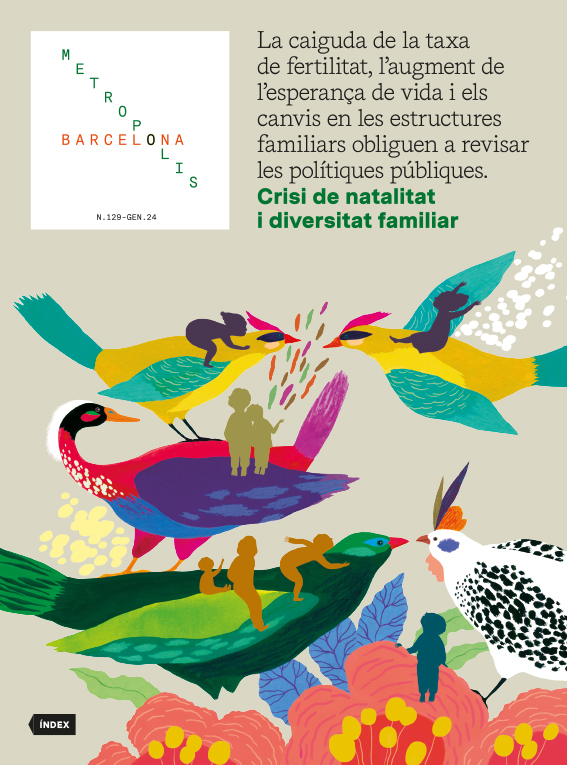Family policies as a public, strategic and worthwhile affair
Birth rate crisis and family diversity
- Dossier
- Jan 24
- 11 mins
In keeping with the model adopted in the Nordic countries, childhood and family policies should cover four areas: the 0-3 age group, the promotion of schools as a key to reconciling work and family life and guaranteeing opportunities, the role of companies in terms of flexible working hours, and the fundamental role played by the community, which should fill the vacuum left by the end of the extended family.
Many families, while we were housebound with children in March 2020, were able to carry on practising our professions thanks to teleworking. Peace of mind on the work front, however, went hand in hand with the uncertainty of how to cope with parenting on account of the closure of schools. Reconciling work and family life for those with children is a juggling act all year round, and this emergency situation brought about by the outbreak of COVID spawned even greater anxiety.
Even for couples, a context in which shared responsibility is the norm, the feeling of work and parenting time encroaching on one another, with no clear boundaries and the sole certainty that we were not addressing either of these domains properly (not to mention the absence of personal time), was very unsettling. Notwithstanding these woes, the pandemic has indeed brought this issue to the fore, as caregiving has earned a place on the public agenda. It seems that family support is increasingly becoming less of a private matter and more of a public issue that also concerns society as a whole.
The future Law on Families and the State’s shared responsibility in Nordic countries
We often wonder why people are having fewer children nowadays. Among other reasons, there are couples who choose not to have children, and others who cannot afford to. As stated in the report Evolving Family Models in Spain[1], Spain has one of the lowest fertility rates (1.2 children per woman versus 1.6 in OECD countries in 2021), despite having one of the highest fertility rates in the second half of the 20th century. The same report points out that public spending on children and families is also insufficient (1.3% of GDP versus 2.1% in OECD countries in 2019).
In view of these figures, and with the aim of making the family a public concern, the Spanish Government’s[2], Draft Law on Families, which has not yet been approved – with the exception of a few measures – due to the early elections, is moving in the right direction. The future law recognises today’s diversity of families in society, and refers to the specific needs of single-parent families and families with children with disabilities. It also highlights the fact that the country is facing a work-life balance emergency that is creating major obstacles to starting a family. Shared responsibility on the part of public administrations is essential to socialise parenting and bring us into line with other European countries.
 Illustration ©Mariona Cabassa
Illustration ©Mariona CabassaIn fact, the Nordic countries are an example of how the State can play a role in fostering shared responsibility by promoting family policies. The massive integration of women into the world of work in these countries, decades earlier than in Spain, meant that they encountered the difficulties of a society in which the gender division based on the specialisation of work and caregiving began to break down earlier. While Southern European countries have been characterised as having a strong emphasis on the family as a provider of welfare, in Northern Europe it has been clear that, without a State to support it, the family will not receive the necessary support to cope in a world in which men and women combine their professional, family and personal lives without any domain taking centre stage.
There is broad social consensus in the Nordic countries to facilitate family and childhood policies as a strategic and worthwhile investment. It is strategic because investing in early childhood yields lifelong preventive benefits, generating greater fulfilment with one’s life, education or career paths. And it is worthwhile because there are more births and, therefore, more men and women to sustain the economy and a generous welfare state, which also requires financing. It is a virtuous circle that also benefits gender and class equality in society.
Four key areas of action
But what do we mean when we talk about childhood and family policies? There are four key areas of action that transcend fundamental aspects such as the prospect of becoming emancipated or gaining access to housing. Firstly, the commitment to the first thousand days of life or, in other words, policies aimed at the 0-3 age group. We are far from being on a par with countries such as Sweden, which has universal and affordable public crèches for everyone. On the other hand, cities such as Barcelona are a benchmark in Spain for their extensive network of high-quality crèches committed to progressively moving towards universality.
Barcelona is indeed a benchmark for its extensive network of crèches, but we still lag behind countries such as Sweden, where they are universal and affordable for everyone.
In the Nordic countries, this commitment clearly contributes to children’s upbringing at a strategic life stage, which is crucial in terms of development; it reduces social inequalities and does not hinder the integration of women into the labour market. Moreover, the Nordic countries also demonstrate the importance of facilitating childcare at home during the first year of life, with equal and non-transferable parental leave. Norway was a pioneer in breaking the male glass ceiling and introducing the “daddy quota” to ensure that caring for infants is not a job reserved exclusively for mothers. Fathers who are involved in the early childhood years have a work and caregiving pattern more similar to that of women, and shared responsibility within the couple is conducive to the desire to have more children. Spain has begun to stand out in this area, and the desire is already being expressed to move towards six-month parental leave for each parent or to implement a universal child-rearing allowance.
Secondly, school-based services are key to contributing to work-family life balance and, at the same time, to ensuring enhanced educational opportunities for children of all ages. We are talking about after-school hours, with extracurricular activities for tutoring, sports and cultural activities within the reach of all families and with child-friendly schedules. We are also referring to holiday periods when children have more than twice as many days off as their parents and, once again, there is a need for options for quality time and recreation among peers, in conjunction with educational leisure organisations. Schools can also become neighbourhood amenities, with yards open at weekends or spaces for sharing to facilitate family time.
Countries such as Portugal show us the benefits of the concept of full-time education, both for children’s educational success and for balancing work and family life. Out-of-school time must be part of public policy if we want to make having a family a viable option for working people, and we do not want to create differences between children or leave room for their time to be occupied with screens, which has serious health implications.
Teleworking and flexitime are not without their challenges: the work environment can encroach on day-to-day life and impact family and personal time.
Thirdly, companies also have a strong voice, with the consensus of social stakeholders and the backing of the authorities. While the COVID pandemic brought caregiving to the fore, we also realised that the world of work should not be based on the need to be on-site in the workplace. Teleworking and flexitime started to be introduced in many companies, which demonstrated that productivity does not necessarily require everyone to be in the same place at the same time. This move towards hybrid work, in which there have been some setbacks, is not devoid of difficulties; in the same way that personal life can virtually enter the work environment, the work environment can also encroach on day-to-day life and impinge on family and personal time. Therefore, we will have to continue working on aspects such as effective digital disconnection, in line with countries such as France, which were pioneers in their legislation. Or learning to manage remote teams, emphasising the value of objective-based work rather than hours worked on-site, and restricting face-to-face time to those moments when shared work is necessary and rewarding.
We are also in the midst of a debate on the reduction of working hours, and there are pilot schemes in Belgium and Spain on the four-day or 32-hour week with the same salary. The benefits and drawbacks will need to be analysed, and consideration will have to be given to exploring how to offset those sectors facing greater difficulties, but on the assumption that societies that are moving towards greater well-being need a better balance between caregiving, work and personal time.
Fourthly, the community and families also play a fundamental role. With the end of the extended family, the help of the community and the mutual exchange of support between families contribute to creating a new scenario that should be encouraged by the government. The idea of the 15-minute city, which emerged in Paris, places value on proximity as a space where time for living, working, learning, caregiving, service provision and recreation can be combined. These cities are more family and child-friendly, and help to offer mutual support at times when parents cannot be there.
Grandparents are not the figures responsible for providing full-time caregiving and, for this reason, families need multiple forms of support.
Grandparents are not the figures responsible for providing full-time caregiving and, for this reason, families need multiple forms of support. Evidently, this support also includes shared responsibility within the couple, since both parents need to be present, and the division of power between the home and the world of work needs to be rebalanced. In this regard, parents could also receive more support by acquiring parenting skills to learn how to cope with having children, to be able to strike a balance between caregiving and personal recreation, and to learn to make room for the place that the group and the individual occupy within the family.
Returning to the lessons learned from such a turbulent time as the pandemic, an opportunity has arisen to redefine the role of families in society and the role to be played by the public, work, community and individual spheres. The future Law on Families, with a holistic vision, or experiences found in the international, State and local spheres make us believe we can be optimistic about the future of this public policy. It is a strategic and worthwhile affair, an investment so as to advance towards a society where the family becomes a pleasant environment and where the combination of identities (personal, work and caregiving) does not generate tensions, but rather wellbeing.
[1] OCDE. Evolving family models in Spain. 2022. via.bcn/kRnK50Q25Pl
[2] Spanish Parliament. Draft Law on Families. 2023. via.bcn/j20t50Q25Ot
The newsletter
Subscribe to our newsletter to keep up to date with Barcelona Metròpolis' new developments




